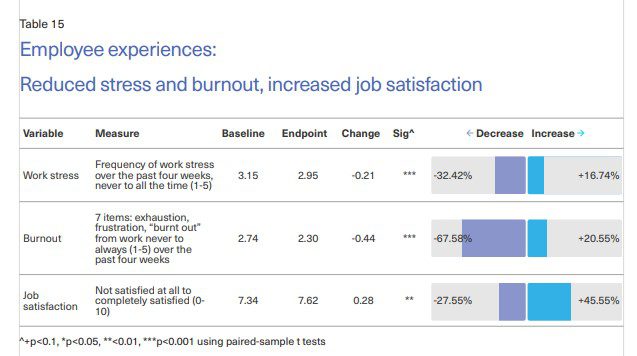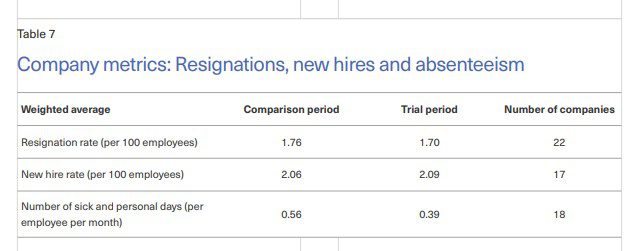The results of a six-month global pilot are in.
4 Day Week Global's six-month pilot of the four-day working week has come to an end.
Find out the results here.
Are you ready to follow suit?
The ‘Great Depression’ in the 1930s triggered the American economy to move from a one-day to two-day weekend. At the same time, Henry Ford standardized the 40-hour five-day workweek in his car factories; he did so without reducing pay.
Now a century later, the concept of a four-day week (without any salary reductions) is gaining popularity. This year, CNN named three executives taking part in a four-day week trial happening in the UK as ‘risk takers’ making big bets that will push global business forward.
The four-day week trial in the UK has been organized by think tank Autonomy and non-profit 4 Day Week Global. 70 companies and more than 3,000 employees participated in a six-month pilot, and early results in the middle of the trial were very promising.
At the same time, 4 Day Week Global hosted a global pilot in the US, Ireland, Australia and New Zealand – 30 companies and 1,000 employees took part in this one. The results are finally in.
The data was collected independently by researchers from Boston College, University College Dublin and Cambridge University.
Their conclusions were that the findings should “serve as a strong signal to employers that it’s time to retire the nearly hundred year old convention of the five day, forty hour week and begin to embrace a four day, thirty-two hour week”.
Overall, the four-day week pilot was a “resounding success”. Companies who participated in the trial ranked their experience as nine out of ten, and zero organizations said they would return to a five-day week after the trial.
Employees ranked the pilot 9.1 and 97% said they wanted to continue with a four-day week.
The data found that revenue was up despite the reduction in work-time– it increased 8% on average over the six-month period and 38% when compared to the same six-month period in 2021.
This links with the increase in productivity during the trial period. Employees rated themselves 7.17 out of ten in terms of productivity before the trial began – this increased to 7.83 at the end.
Companies agreed, giving the organization a 7.6 for performance and a 7.7 for productivity at the end of the trial.
What is crucial here is that this productivity wasn’t due to individuals working overtime or more intensively during their four-days. Instead, the productivity gains come from the reorganization of work – aka a reduction in unproductive time like meetings.
Employees saw an impressive increase in wellbeing – their stress and burnout declined, while their work-life balance improved.
Stress declined on average from 3.15 to 2.95 over the six-month period – although 17% reported an growth in stress, twice as many saw a reduction.
67% reported lower levels of burnout, compared to 26% seeing an increase. Burnout scores improved from 2.74 to 2.30 during the trial.

In terms of work-life balance, the data showed that this improved from 2.90 to 3.02 during the study; employees were particularly pleased they had more time to exercise, spend time with family and do errands because they worked fewer hours.
These gains around revenue, productivity and wellbeing are very impressive.
But “perhaps the bottom line for success is what we found in terms of how much more employees valued their current job at the end of the trial”, stated the report.
The academic researchers asked employees how much of a pay bump would they require to take a new job and return to a five-day week schedule.
32% said up to 25% increase, 42% said a 25% to 50% raise, 13% said a 50% increase while 13% said no amount of money would persuade them to go back to a five-day a week job.
One of the respondents actually stated: “The four-day work week is equivalent to 25% pay bump in my opinion.”
Unsurprisingly, the research found that resignations were down slightly from 1.76 to 1.70 compared to the same six-month period in 2021.

This is positive news for companies in the trial who are, like the rest of the corporate world, grappling with the ‘Great Resignation’.
This confirms data from Qualtrics that found that a four-day week improved employee loyalty and talent acquisition.
Are you ready to give the four-day week a go and see improvements in not just retention, but productivity, wellbeing and business bottom lines?
The International Festival of HR is back! Discover amazing speakers at UNLEASH America on 26-27 April 2023.
Get the Editor’s picks of the week delivered straight to your inbox!

Chief Reporter
Allie is an award-winning business journalist and can be reached at alexandra@unleash.ai.
"*" indicates required fields
"*" indicates required fields